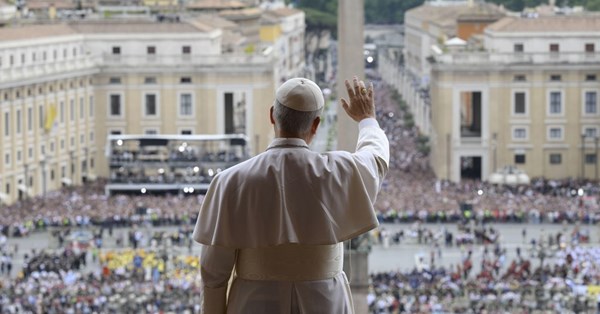THE new Pope has declared his Church’s solidarity with journalists who suffer for reporting the truth, while urging the world’s media to help counter “paradigms of war” across the world.
“The suffering of imprisoned journalists challenges the conscience of nations and the international community, calling all of us to safeguard the precious gift of free speech,” Pope Leo XIV said on Monday.
“The Church recognises in these witnesses, those who report on war at the cost of their lives — the courage of those who defend dignity, justice, and the right of people to be informed, because only informed individuals can make free choices.”
The Pope was addressing hundreds of reporters and editors in the Vatican’s Paul VI Hall, four days after his election on 8 May (News, 9 May). Media workers, he said, stood at the forefront of “conflicts and aspirations for peace, situations of injustice and poverty”, and should “consciously and courageously” choose the path of communication for peace.
“We do not need loud forceful communication, but rather communication capable of listening and gathering the voices of the weak who have no voice,” he said. “Let us disarm communication of all prejudice and resentment, fanaticism and even hatred. Let us free it from aggression — by disarming words, we will help to disarm the world.”
The Pope, an Augustinian friar who holds joint American and Peruvian citizenship, and who was Bishop of Chiclayo in Peru from 2015 to 2023 before being appointed Prefect of the Vatican’s Dicastery for Bishops, is currently considering nominations to key Vatican positions.
Preaching to his cardinals on Friday in the Sistine Chapel, he said that his Church needed to become “ever more fully a city set on a hill”, and “a beacon illuminating the dark nights of this world” — but through the holiness of its members, rather than “the magnificence of structures or the grandeur of buildings”.
He said that the Christian faith was often “considered absurd, meant for the weak and unintelligent”, in contemporary settings where people chose other securities such as technology, money, success, power or pleasure. “It is not easy to preach the gospel and bear witness to its truth, where believers are mocked, opposed, despised, or at best tolerated and pitied,” he told the cardinals.
“There are the places where our missionary outreach is desperately needed. A lack of faith is often tragically accompanied by loss of meaning in life, neglect of mercy, appalling violations of human dignity, crisis in the family, and so many other wounds afflicting our society.”
In his first regular address to tens of thousands of the faithful in St Peter’s Square on Sunday, the Pope appealed for more vocations, and spiritual support for young people.
He welcomed the latest ceasefire between India and Pakistan, and called for an “authentic, just, and lasting peace” in Ukraine, as well as for humanitarian aid to the “stricken civil population” of Gaza, alongside the freeing of Israeli hostages.
“The immense tragedy of the Second World War ended 80 years ago on 8 May, after having claimed 60 million victims,” he said. “In today’s dramatic scenario of a piecemeal third world war, as Pope Francis stated many times, I too address the world’s leaders, repeating the ever-timely appeal: ‘Never again war!’”
In his homily in the Sistine Chapel, the former Cardinal Robert Francis Prevost said that he had chosen his papal name in a search for “truth, justice, and fraternity”, recalling efforts to address social questions after the Industrial Revolution by Leo XIII (1810-1903).
He said that the Church offered “the treasury of her social teaching” in response to current economic challenges, at a time when developments in artificial intelligence posed “new challenges for the defence of human dignity, justice, and labour”.
The Pope travelled out of Rome on Saturday to visit a Marian sanctuary run by his Augustinian order, and prayed at the white-marble tomb of Pope Francis at the Basilica of St Mary Major.
While his approach to Anglicans and other Christian denominations remains unclear, Leo XIV urged the cardinals on Saturday to uphold the “precious legacy” of Pope Francis, and signalled a “complete commitment” to the paths taken since the Second Vatican Council.
He also endorsed “fundamental points” from the late Pope’s 2013 Apostolic Exhortation Evangelii Gaudium (Comment, 20 December 2013), including “collegiality and synodality”, “attention to the sensus fidei”, “loving care for the least and rejected”, and a “courageous and trusting dialogue with the contemporary world”.
Speaking on Monday, Pope Leo urged journalists to resist mediocrity, as well as “stereotypes and clichés”, and to say no to the war of words. “Disarmed and disarming communication allows us to share a different view of the world and to act in a manner consistent with our human dignity,” he said.
“Peace begins with each one of us: in the way we look at others, listen to others, and speak about others.”
The Pope will meet diplomats accredited to the Vatican on Friday, ahead of his formal inauguration as the 267th pope since St Peter, and the first native English speaker since the 12th century Pope Hadrian IV, at a ceremony at the Vatican on Sunday attended by world leaders.
In the absence of an Archbishop of Canterbury, the Anglican Communion is to be represented by the Presiding Bishop of the Episcopal Church in the United States, Dr Sean Rowe.

















